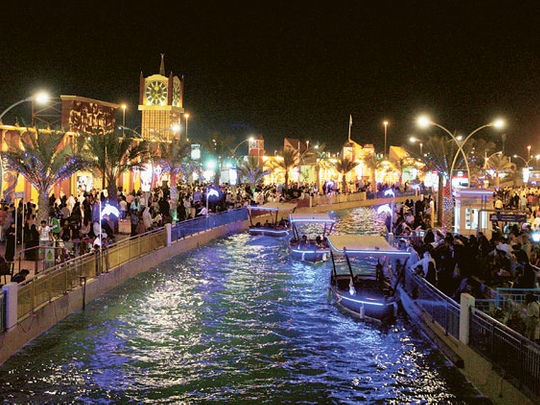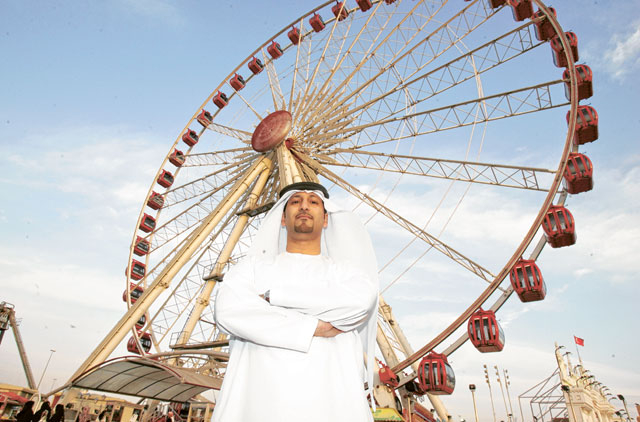
Dubai: The Global Village has been an entertainment fixture in winter for UAE residents for 16 seasons. However, plans to turn the Global Village into a year-round venue have been shelved until the world economic outlook improves and the political upheaval in the Arab world stabilises, Saeed Ali Bin Reda, chief executive, told Gulf News.
While the idea has not been entirely dismissed, retailers from certain countries that participate in the Global Village are experiencing production cuts as their economies slow down, he said.
The management will continue consulting with retailers at the Global Village who come from all over the world, especially Europe and the US, whose economies are faltering.
In an interview with Gulf News, Bin Reda discusses the impact of the Arab Spring on participating outlets, how the Global Village provides a platform to launch small businesses looking for a big break and the process of transforming the Global Village into a brand independent of the Dubai Shopping Festival.
Gulf News: How is Global Village different this year from past editions?
Saeed Ali Bin Reda: Every year we try to have new offerings. This season we focused on renewing the façade of the pavilions so they embody the sights and symbols of the participating countries. It reflects their culture. All participants are obligated to do this. We have new ideas such as the Event Tent. It has a 700-person capacity for special events that we will announce soon. We will have niche shows such as fashions shows for women and children.
For the first time this year, Tunisia, Spain and some African countries are participating.
We have the dancing fountain for the first time. Attendance is excellent so we put up six shows a day. There is the water screen that showcases the past five editions of the Global Village.
There were plans to make Global Village a year-round event. What is the status of this?
The Global Village has participants from around the world. But since 2008, since the global recession affected everyone, its economic impact is felt until today. Politically, the Arab Spring also has an impact.
In Europe and America there is an economic impact and in Arab countries there is a political impact. So we need to take this into consideration. We cannot ask them to come year round if there is a negative effect. We have to consult with our international participants in the Global Village.
In 2012, there won't be a year-round edition until the economic situation in the US and Europe improves and the political circumstances in Arab countries stabilise.
What was the feedback from retailers on participating all year in Global Village?
The response from Europe was weak, from Asia it was strong. From the Americas we got a weak response and from Arab countries it was strong. We take this into account.
At the moment there is less production capacity in some countries, especially European countries where the debt crisis is still ongoing.
Has there been a weaker turnout from Arab countries that witnessed political turmoil this year?
No, actually we were surprised that Arab countries even with the political impact they experienced, had a strong presence and economic participation in the pavilions and shows.
This season in the Global Village there is even an Egyptian Museum in Dec-ember for National Day and a studio that showcases the Pharaonic way of life.
Besides these hurdles, how feasible is Global Village during the summer months?
It is possible. We need to study it well. We could have it indoors, with huge air-conditioned halls that can take the capacity of 2,500 outlets. It is under study but we cannot take a step while the external economic and political impacts still exist.
There was a masterplan for Global Village to build a hotel, warehouses for retailers and other logistical support. Is this on track?
The masterplan can be done, there is no problem. But this is not the right time. In Dubai, the infrastructure and real estate has developed very quickly. Now you see many hotels, the closest to GV is in Oasis City and the University City with the Metro and transportation. But the masterplan can be done anytime. We don't want to go ahead because it's not the time for it, there are many hotels around Dubai. It's not time because we cannot have hotels and accommodation with GV running for four months only, what should I do with them for the rest of the year?
For the warehouses, we have long-term storage with sister companies such as Dubai Industrial City and in Jebel Ali. We also have short-term storage in the GV with a space of 300,000 square feet.
There are no plans to build more warehouses because the products are sold within four months and also 20 to 30 per cent of retailers who come to GV change every year.
Global Village has become an independent entity after its launch in 1997 as part of the Dubai Shopping Festival. How are you reinventing the concept or image of GV in future?
Going forward, we hope to see the Global Village go outside the UAE and have locations in other countries that we will study after this year's event.
We have to visit the countries and see the potential for co-operation. The Dubai government has provided all possible government resources to make this event a success. By this I mean Dubai Police, Dubai Municipality, RTA, Immigration and Residence and Civil Defence on a large scale.
So when we take the Global Village internationally we have to make sure the countries will make these resources available, otherwise its management will be difficult.
The vision is to take it international, not just regional.
We have trained staff, policy, procedures and laws that we can implement internationally. The Global Village has become a franchise and we can apply the idea anywhere in the world.
How long will it be before this vision becomes a reality?
This can be done in the next three years, we hope. Liaising with government authorities, especially in the Arab world, can take a while for procedures to happen.
Will revenues increase (and by how much) if GV becomes an international franchise?
Income will vary between countries. We will go where there is a large population and purchasing power, where there's revenue and capital.
This can be done in Arab countries like Egypt, Syria, Jordan or Asian countries like India, Pakistan and we take into consideration ease of procedures and safety.
How successful can GV be in going international when other countries also have a similar concept of global exhibitions?
Where we go there will be festivals of course but we take our brand, standards and quality.
How much is the rent per square metre for pavilions and is it affordable enough to provide a platform for small businesses looking to break into the market?
In general, GV is good for two categories: Small and medium enterprises. Some of our participants set up stalls here and then opened in Dubai Mall.
The GV concept is not an exhibition, it is festivals under the umbrella of a village. It's not just business to consumer, it's become a business to business [B2B]. GV has become a platform for traders and SMEs for trading.
We have a partnership with the MBRE to give members a 50 per cent discount on rent for young entrepreneurs who want to start small enterprises for the first time.
Rent for a 4x4 metre space is Dh50,000. With the discount for SMEs it is Dh25,000 over four months. This is a very small price in return for the experience and financial benefit gained on the location. They either continue participating every year or open up in big malls.
Global Village announced recently a total business of Dh1 billion for 2010. What does this constitute?
In the four months of 2010, the transactions in GV including construction, staff salaries, sales, rent and F&B reached Dh1 billion. This is the amount of income and expenditure.
What are the total profits for 2010?
We do not announce revenues, these are under the parent company Tecom Investments. But GV has a good revenue and reinvests some of it.
By how much has revenue grown or declined and what are the main sources of income?
Every year revenue grows by 1 per cent to 3 per cent.
This year we expect revenue to increase by about 5 per cent. This is through tickets, rent, sponsorship and services we offer such as VIP packages and paid parking close to the gates.
We re-invest some profits internally to fund cultural shows from Europe and Asia. This includes air tickets and accommodation for the performers. And also funding for National Day events.
Where the rest of the revenue goes is decided by Dubai Holdings, as the parent company of Tecom Investments and the Global Village.
We do not take any money from retailers' profits, to encourage them to participate every year.
Does GV need government support at the moment or is it self-sufficient?
Since 2005, we are not taking any financial government support but we do take service support. Issuing visas, medical cards and offices in GV for the civil defence, Dubai Municipality, food inspection authorities, Ministry of Economy and of course we pay all government fees.
What are the safety precautions you are taking this year?
We have made changes to our process. We hired engineering consultancies and contractors inspected by Dubai Municipality so there would be no problems. They specialise in building these pavilions. We have 20 companies working on GV.
What is the rate of occupancy in GV pavilions and shops?
During the first week, the occupancy of stores open in pavilions was 90 per cent to 80 per cent. Now we are over 100 per cent capacity, with retailers on the waiting list but we have closed entries already.
Expansive offering
- 10,000 employees are needed to run Global Village.
- Global Village occupies 10 million square feet out of the 17 million square feet area of Dubailand where it relocated in 2005.
- 20 contractors and engineering consultancies manage the construction of pavilions.
- 2,500 participating outlets, 40 countries presented and 5,000 cultural shows will run during 124 days of Global Village.
- Global Village will runs from November 1 to March 3 in its longest edition to date
- Global Village began in 1997 under the management of Dubai Shopping Festival. It is now taken over by Tecom Investments.
Right trajectory
Saeed Ali Bin Reda took the reins of Global Village in 2006, bringing 15 years of management experience. He began his career in 1994 with the Emirates Airlines Group. In 2003 he joined the Dubai Development and Investment Authority as Head of Procurement. Later he moved to Dubai Industrial City as Head of Sales. He has won several awards including the Bright Ideas award from Emirates Airlines Group, the Best Leader and Best CSR award from Tatweer and the Best CSR Initiatives Company in the Arab Region award. Bin Reda holds a bachelors degree in Business Administration, a higher national diploma in Business Management with a major in Tourism Management and a diploma in Enigeering.












